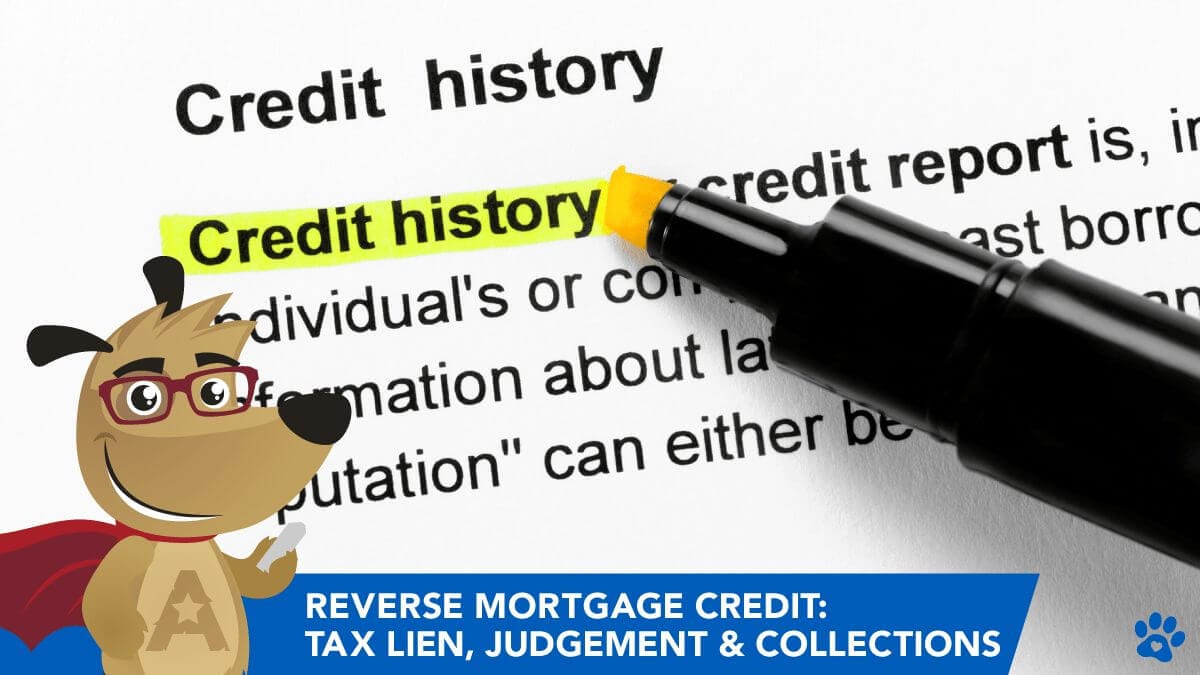
America’s #1 Rated Reverse Lender*
Reverse Mortgage Credit: Tax Lien, Judgement & Collections
 |
Michael G. Branson, CEO of All Reverse Mortgage, Inc., and moderator of ARLO™, has 45 years of experience in the mortgage banking industry. He has devoted the past 20 years to reverse mortgages exclusively. (License: NMLS# 14040) |
 |
All Reverse Mortgage's editing process includes rigorous fact-checking led by industry experts to ensure all content is accurate and current. This article has been reviewed, edited, and fact-checked by Cliff Auerswald, President and co-creator of ARLO™. (License: NMLS# 14041) |

How Credit History Can Affect Your Reverse Mortgage Eligibility
Court judgments and outstanding state or federal tax liens can blemish your credit history and make borrowing difficult. These derogatory marks on your credit report can also hinder your ability to get a reverse mortgage.
A reverse mortgage allows homeowners age 62 and older to borrow against their home equity, which they may receive as a line of credit in a lump sum or monthly loan disbursements. The loan is generally repaid when the borrower passes away or permanently vacates the home.
To qualify, a loan applicant must be at least 62 years old, have sufficient home equity, and pass a financial assessment that determines if the applicant has the willingness and capacity to sustain the reverse mortgage while also being able to make timely payments of property taxes, homeowner’s insurance, or any other applicable property charges.
Loan applicants may still qualify if they have an existing mortgage. However, the reverse mortgage must be in the first lien position, so any existing debt must be paid off before proceeding with the reverse mortgage.
When lenders conduct a financial assessment, they review any sources of the applicant’s income and examine the person’s credit profile, including the applicant’s history of paying property charges.
If a lender finds that an applicant has any payment delinquencies, court judgments, or state/federal tax liens, this raises a red flag that requires immediate attention.
Tax liens and Judgements
The appearance of any court judgements or state/federal tax liens on an applicant’s credit history will require the lender to halt the reverse mortgage application’s processing until these matters are resolved.
Tax liens are the government’s claim against all or some of your assets based on your failure to pay a tax debt on time. They may occur locally at the state level or the federal level.
If you haven’t paid or owed property taxes or have any back payments on your income taxes, you may have a tax lien on your credit history.
Court judgements differ from tax liens, however, they are treated similarly during the reverse mortgage loan process.
Credit report agencies commonly obtain judgment records from courthouses and place them on consumer credit report cards, which can remain for seven years from the filing date, according to Credit Sesame.
Resolving outstanding debts
Individuals with delinquent tax debt will be required to work with the IRS to establish a valid repayment plan to satisfy the debt.
To be eligible for a reverse mortgage, these prospective borrowers must make timely payments on that repayment plan for at least three months.
Prospective borrowers with delinquent tax debt also have the option to repay the debt out of pocket using their resources, if available.
It is important to note that while you can use the loan proceeds from a reverse mortgage to pay down an existing mortgage balance, you cannot use the loan proceeds to pay off tax liens, according to the Department of Housing and Urban Development, which regulates the federal Home Equity Conversion Mortgage (HECM) reverse mortgage program.
It’s in the best interest of anyone planning to apply for a reverse mortgage to ensure they do not have any outstanding liens or judgements against them.
But if they do, these matters must be addressed before moving forward with the loan process, whether that means satisfying the debt by paying it in full or establishing a repayment plan to get on the right track.
If you are considering applying for a reverse mortgage and would like to learn more about the qualifications for this loan product, request your quote today!
2024 HUD Credit Guidelines Update:
Medical collections and judgments are now excluded from expenses and no longer require a Letter of Explanation (LOE), irrespective of the amount or balance.
ARLO recommends these helpful resources:

 Michael G. Branson
Michael G. Branson Cliff Auerswald
Cliff Auerswald

November 11th, 2025
November 11th, 2025
September 18th, 2025
September 20th, 2025
September 13th, 2024
September 14th, 2024
March 25th, 2024
March 25th, 2024
December 27th, 2023
December 27th, 2023
October 28th, 2022
November 4th, 2022
January 29th, 2022
February 2nd, 2022
December 19th, 2021
December 19th, 2021
November 22nd, 2021
December 7th, 2021
July 19th, 2021
July 19th, 2021
November 22nd, 2020
November 24th, 2020
July 10th, 2020
July 10th, 2020
August 5th, 2024
August 6th, 2024
March 19th, 2020
March 19th, 2020
July 12th, 2019
July 12th, 2019
May 31st, 2019
May 31st, 2019
August 18th, 2019
August 19th, 2019
April 17th, 2019
April 17th, 2019
November 14th, 2018
November 15th, 2018
July 15th, 2018
July 16th, 2018